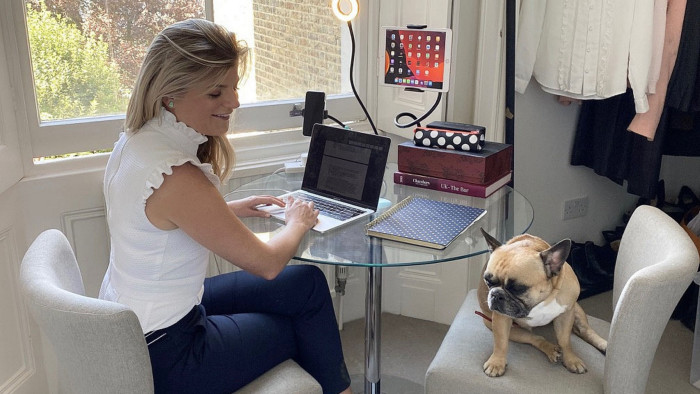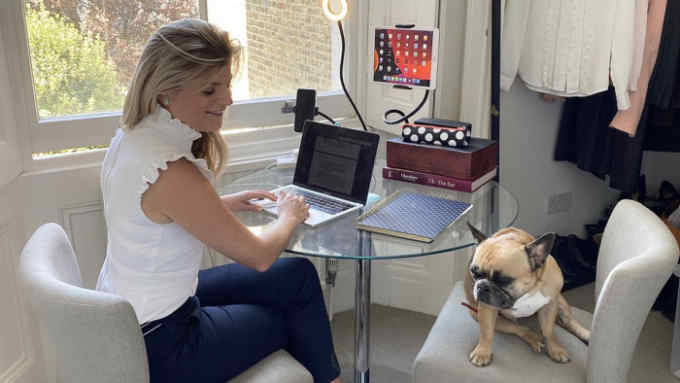Courts test their online future, from dress-down lawyers to witness appearance

Roula Khalaf, Editor of the FT, selects her favourite stories in this weekly newsletter.
The hearing in London’s High Court to decide whether to put scandal-hit NMC Health, one of the biggest healthcare providers in the Middle East, into administration this month was bound to attract great interest.
But the coronavirus pandemic had just taken hold. So, instead of involving dozens of creditors and lawyers cramming into a London courtroom, the hearing became one of hundreds of court cases to take place via video conferencing in the past month.
The global Covid-19 crisis has dragged the legal profession further into the 21st century. Courts around the world are replacing face-to-face hearings with video hearings, using phonelinks and platforms such as Zoom and Skype.
The entire High Court trial in London brought by the Republic of Kazakhstan over claims for $530m made against parties including Moldovan businessman Anatolie Stati and US bank BNY Mellon, was conducted in late March via Zoom and live streamed on YouTube. On March 24, the UK’s Supreme Court heard Fowler v Commissioners for HMRC online.
The High Court trial was streamed live on YouTube after the UK passed the Coronavirus act, which is not designed to be permanent. It has provisions for more use of video links in criminal trials and new rules about streaming cases live to allow public access.
Now a picture is now emerging of the successes and challenges of “virtual courtrooms” so far — as well as what works, and what may need to wait for the return to real court venues.
As Thomas de la Mare QC, a barrister at Blackstone Chambers, notes: “The more personal and difficult the issue, then the more difficult a remote hearing.”
Room with a view
Barristers and judges now appear in court from home. But while children bursting in on the Zoom meeting of a working parent might raise a smile from colleagues in some situations, it is a serious matter if they disrupt a High Court hearing.
The London-based Inns of Court College of Advocacy, a training organisation, has issued guidance on preparing for video court hearings from home. Put personal or distracting items such as pictures and ornaments out of sight, it advises: “The camera may show more of the room than you expect.” It also reminds lawyers to use the mute button to exclude noises, from coughs and doorbells to dishwashers, typing and rustling papers.
Hilary Lennox, a family law barrister at 5 St Andrew’s Hill in London, was anxious about what would happen when physical court proceedings ground to a halt in March: “I am in court most days and . . . we were all concerned,” she says.
However, after five remote hearings, including a High Court case involving an emergency hearing over Skype, she says the technology has worked well. Ms Lennox has also appeared in a financial dispute resolution hearing, using Lifesize videoconferencing that replicated a courtroom, when she represented a client and a solicitor in Ireland.
The only hiccup came when her French bulldog Willow jumped on to her knee. “I had my Airpods in and was really focused on what was happening in the hearing,” she says. “Everyone laughed and the judge said ‘I think we have an intruder’.”

Yet some advocates may have gone too far in abandoning the formality of the courtroom. In the US, Judge Dennis Bailey issued a blunt message to the Weston Bar Association in Florida that court hearings on Zoom are “not casual phone conversations”.
Under-dressed lawyers received a dressing down. “One male lawyer appeared shirtless and one female attorney appeared still in bed . . . So, please, if you don’t mind, let’s treat court hearings as court hearings, whether Zooming or not,” Judge Bailey said.
Radical innovations: what works?
Richard Susskind, whose latest book is Online Courts and the Future of Justice , predicts that litigation is facing far more radical transformation than parties dialling into online hearings.
“If you’d have said a month ago that hearings will be online and virtual, you’d have scoffed at that,” Prof Susskind says. One benefit may be better access to justice, he adds. “There is no point having a system that is just open for a small percentage of people.”
He has helped launch a new website, Remote Courts Worldwide, which details what different jurisdictions are doing to continue hearing cases during the pandemic. Courts in Singapore have turned to Zoom to hear civil and family cases; Dutch courts are hearing urgent cases via Skype; and Argentine courts are using videoconferencing for detention control hearings.
In the US, some courts have moved faster than others. Judge Scott Schlegel of the Louisiana 24th Judicial District Court is head of technology for the judges’ association in the state. He had already been pressing ahead with digitising court records and using video conferencing for civil hearings.
He says: “We have been working on modernisation of the court system for quite some time — and so the transition has been painful like everyone else, but not too painful as a lot of the bones were already in place.”
The Covid-19 outbreak prompted the court’s move to videoconferencing for first appearances in criminal cases, for example. Judge Schlegel has helped in the rollout of a chatbot that sends text messages to individuals being supervised remotely by courts for drug offences.
In England and Wales, new figures show that around 40 per cent of all court hearings have continued. Some are still being conducted in the traditional way, but others by using phone, video or the internet.
Between March 19 and April 6 the number of court cases in England and Wales using audio grew from 100 to 1,850 hearings and those using video conferencing rose from 150 to 1,100, according to HM Courts & Tribunal Service
Ian Burnett, Lord Chief Justice, one of the country’s most senior judges, said in recent guidance to judges that “we have all surprised ourselves by the progress that has been made in such a short time”.
However, some types of court hearing are not suitable for remote treatment — they may be highly emotive, hotly contested or both.
Cases involving, say, immigration, divorce or children’s welfare, are more difficult, particularly if a litigant in person is involved.
In a recent case held entirely by Skype in the Court of Protection, which deals with cases involving vulnerable people, the daughter of the man at the centre of a case on disputed enforcement of healthcare, reportedly said it felt like “a second-rate hearing”.
“The hearings work better in commercial cases where the issue is not personal but is focused on a point of law, for example,” says Mr de la Mare. It works less well when it comes to witnesses.
“It’s easier to forget in a remote hearing that it’s about someone’s dad on a life support machine, for example. In a court you can see the faces of advocates and an individual welling up with tears. You can’t replicate that.”
Lord Burnett’s guidance notes that online hearings have proved “unusually tiring” for some parties and says he will explore whether parties who “misbehave” — such as litigants yelling at judges — could be muted. Many of the cases heard remotely so far have “not been long hearings involving difficult evidence or high emotion, and for obvious reasons”.
The verdict so far: ‘not business as usual’
Yet it seems likely that at least some new practices will outlast the pandemic. Mr de la Mare believes that pre-trial hearings such as case management will increasingly be held virtually.
Judges have started to tell parties that forthcoming High Court trials will be staged remotely rather than adjourned.
John Kimbell QC, sitting as a Deputy High Court Judge, recently refused an application to adjourn a five-week £250m trial, involving four factual witnesses and 13 expert witnesses, arguing that the experience of remote trials had been, on the whole, successful.
But, in his guidance, Lord Burnett says that while judges have risen to working in remarkable ways to help keep the wheels of justice turning, it is nevertheless still “not business as usual” in the courts.
“Realistically, it cannot be until the emergency subsides,” he says.

Comments